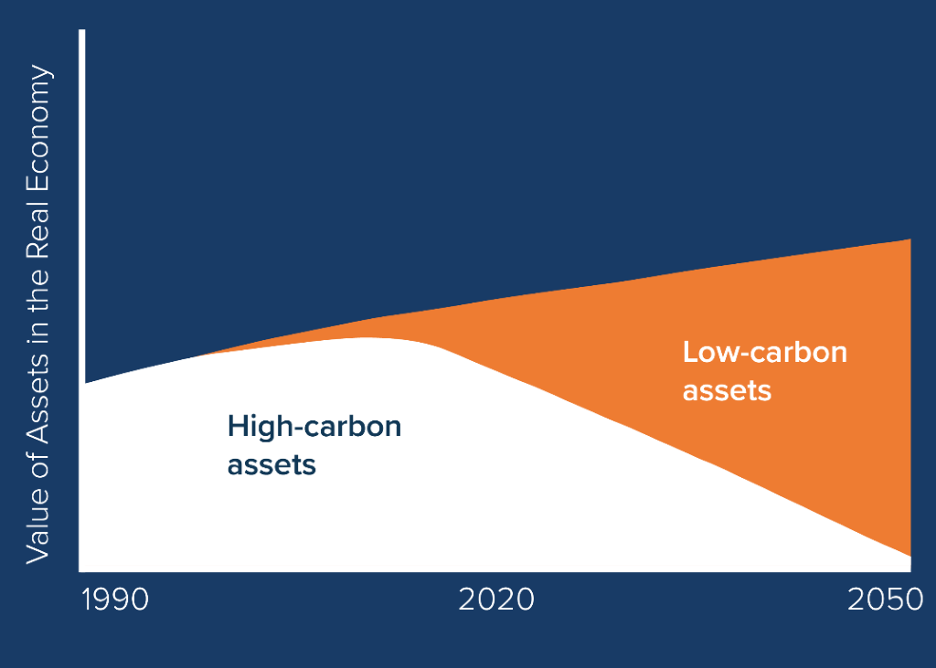Low angle view of modern skyscrapers in Midtown Manhattan.

From Pledges to Action: RMI Launches the Center for Climate-Aligned Finance
Ratcheting down carbon emissions to net zero by the middle of the century is a historic project without parallel in human history. It is not the responsibility of any single country or any single sector. But one sector provides the lifeblood that powers all the others: finance.
The financial sector is waking up to its opportunity—and responsibility—to take an active role in driving the low-carbon transition. Financial institutions (FIs) have been experimenting with climate action in recent years, launching eye-popping green finance goals, ratcheting up their exclusions for funding coal and particularly egregious fossil projects, and upping their game on climate risk assessment and disclosure.
Yet these steps, though laudable, do not add up to a strategy comprehensive or ambitious enough to meet the greatest challenge of our time. Those FIs brave enough to quantify the global warming impact of their portfolios have found they are way off track from aligning their lending or investment with the goals of the Paris Agreement.
The Center for Climate-Aligned Finance
Today, Rocky Mountain Institute (RMI) is proud to launch the Center for Climate-Aligned Finance. This ambitious effort will enable FIs to actively help shape the transformation of carbon intensive sectors alongside their clients on the journey to net zero global emissions by 2050. We begin our work with a combination of humility and resolve: decarbonizing steel, cement, aviation, heavy transport, and global utilities, while contributing positively to inclusive and just economic development will not only require innovation in the financial sector. It will also require major leaps in the commercialization and scaling of new technologies, business models, and evolving consumer preferences.
But FIs have only begun to explore the tools at their disposal to drive these changes and do so profitably. To help drive the global economy to net zero emissions by 2050, a financial institution must become “climate-aligned,” that is, to shift its portfolio and investment decisions in line with a 1.5C trajectory. Simple in concept, climate alignment is very challenging to achieve, particularly for large broad-based financial institutions.
We’ve mapped out some of the barriers that all financial institutions, however bold, will encounter to achieving climate alignment and how to overcome them. To achieve decarbonization, we must accept that climate finance is not just about doing more clean investment. Indeed, the hardest part of this is how to transition existing corporates and assets invested in the fossil economy. We might divest our way out of certain sectors, but not the core industrial sectors which are woven into the fabric of our global economy. In short, we can’t simply build a clean economy on top of a dirty one.
Therefore, we applaud those financial institutions which have pledged to hold themselves accountable to a net-zero target. These commitments remind us that setting ambition matters and that setting your sights for a net-zero future is the gold standard. We’re delighted to have pioneers in sustainable, just, and equitable investment such as Amalgamated Bank and Vision Ridge Partners as supporters of the Center. We hope to provide tools, insight, and initiatives that support the leading edge of this movement.
Scaling Our Ambition
One of the notable features of the Center is that its Founding Partners include four of the world’s largest private commercial investment banks. To successfully tackle the transition issues head-on, we need to engage the financial institutions most deeply engaged in the high-carbon economy.
Setting ambition and demanding that action is taken with haste is needed. But let’s be clear: much of the hard work of figuring out how to make these bold ideas into reality remains to be done. If we want the largest institutions to help engineer a wholesale shift in the way they and their clients do business, it is not enough to push them through pressure alone. We need to acknowledge the difficulty of accomplishing these goals and put our shoulder to the wheel in developing the solutions methodically and quickly.
In particular, change of this scale cannot be accomplished within the financial sector alone, but only by triggering the complex interplay of real economy and financial sector action. Inspired by the Poseidon Principles—a sustainable framework for global shipping finance—the Center for Climate-Aligned Finance seeks to engineer coalitions of financial institutions, leading corporates, their customers, and policy makers to drive deep decarbonization by tackling the carbon-intensive, economically important sectors directly.
We will pursue the goal jointly with some of the world’s leading organizations in driving the decarbonization of sectors and industrial companies. Through our partnership with the Mission Possible Platform, we join a coalition of businesses, experts, and governments focused on the decarbonization of heavy industry.
We will work to engage the unparalleled network of banks, insurers, and investors organized under the aegis of the UN Environment Programme Financing Initiative (UNEP FI) to develop the norms, practices and frameworks necessary to achieve net zero. We’ve teamed up with Ceres—a leader in organizing investors and corporate leaders to facilitate action from the boardroom to the governance of capital markets. In partnership with leading platforms and organizations like Partnership for Carbon Accounting Financials (PCAF) and 2° Investing Initiative (2DII), we will work to equip financial institutions with the tools and methodologies to achieve climate alignment and ensure that these actions have a quantifiable impact on emissions.
Fulfilling the promise of climate-aligned finance won’t be easy. And it won’t be accomplished unless financial institutions large and small, leaders on climate or just beginning the journey of climate alignment, roll up their sleeves and help create, not simply follow, an ambitious decarbonization trajectory. The Center’s work is one of action. This is why we are proud to engage with a broad range of financial institutions, engaging their knowledge, experience, scale of influence, and creativity to address the barriers towards a net-zero future.
